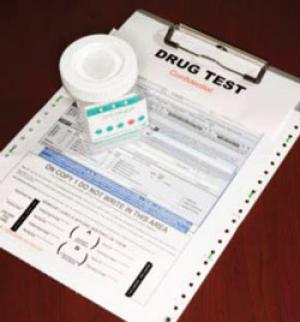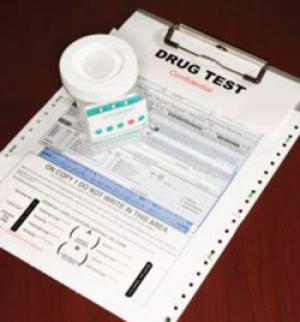Oregon Democrat Earl Blumenauer held a public coming out Monday for his federal medical marijuana bill.
Martin Lee has produced an excellent comprehensive history of marijuana, and Jim Rendon pays homage to those outlaw growers and breeders who bring us things like OG Kush and Granddaddy Purps. We review their books.
We continue our newest gift offer -- and several older but good ones -- for StoptheDrugWar.org supporters donating $15 or more.
The US 11th Circuit Court of Appeals has upheld a preliminary injunction blocking the state of Florida from implementing its welfare drug testing law. The law violates the Fourth Amendment's proscription against warrantless searches, the court found.
North Dakota's legislature rejected a welfare drug testing bill Friday, even after it was amended to first require "reasonable suspicion."
The Indiana House has passed a welfare drug testing bill despite a fiscal analysis showing it would be a net loser for the state, costing taxpayers more than $1 million a year.
From the village board to the halls of Congress, medical marijuana is popping up all over. And there's action at various state houses, too.
A North Carolina House committee has not only failed to approve a medical marijuana bill, it has acted to ensure that the topic cannot be raised again this session.
An overzealous Connecticut SWAT team killed an unarmed man during a 2008 drug raid that turned up a pair of crack pipes and a small amount of cocaine. Now, five towns have agreed to pay $3.5 million in one suit, and a second is pending.
Three bills dealing with marijuana law reform have been filed in Missouri.
Marijuana legalization bills have been filed in two more states. That makes five this year, with a couple more expected to follow.
Suspected dirty cops are under investigation in Texas and Alabama, a light-fingered (and well-connected) Philly cop gets suspended, a Texas cop gets in trouble for trying to set up the -ex, and an Indiana cop sells weed and guns to the wrong guy.
Rep. Earl Blumenauer (D-OR) Monday gave a public coming out event for a bill designed to stop federal government interference with medical marijuana patients and providers in states where it is legal. The bill debuted at a press conference where Blumenauer was surrounded by medical marijuana supporters who were in town for meetings and lobbying as part of the National Cannabis Unity Conference sponsored by Americans for Safe Access.

(photo from safeaccessnow.org)
The bill,
House Resolution 689, is known as the State's Medical Marijuana Patients Protection Act. It is the latest effort to find a way to end federal interference in medical marijuana states. It has 13 cosponsors, including California Republican Rep. Dana
Rohrabacher.
The bill aims "to provide for the rescheduling of marijuana and for the medical use of marijuana in accordance with the laws of the various States." It calls on the Department of Health and Human Services and the DEA to reschedule marijuana to a schedule other than Schedule I or II.
Schedule I -- where marijuana is currently placed -- is reserved for substances with a high danger of abuse and "no currently accepted medical treatment in the United States," while Schedule II drugs have lower abuse potential and some accepted medical uses. Schedules III, IV, and V, where the bill mandates marijuana should be placed, all have some accepted medical use and "moderate to low," "low," and "lower" abuse potential, respectively.
The bill also bars the use of the Controlled Substance Act to "prohibit or otherwise restrict" medical marijuana prescribing or recommending, possession or cultivation, or distribution of medical marijuana in states where it is legal.
The unwillingness of the federal government to either restrain itself in states where medical marijuana is legal or to allow for it to be rescheduled has led to tension and conflict between the states and the federal government,
Blumenauer said.
"This means that the 19 jurisdictions that permit medical marijuana are operating in a patchwork of inconsistent local and federal laws," he explained. "These inconsistencies create significant challenges for both patients and the businesses working to provide access to medical marijuana.Frankly, the people in the federal bureaucracy are in an impossible position. The bill gets the federal government and the Department of Justice out of this never-never land."
Also addressing the press conference was Dr. Karen
Munkacy, a breast cancer survivor who helped lead the successful campaign for medical marijuana in Massachusetts last year. The lack of protection for medical marijuana patients left her faced with a cruel dilemma, she said.
"I had to choose between breaking the law and suffering terribly,"
Munkacy said. "And I chose to suffer terribly."
Iraq war veteran Scott Murphy told the press conference that 22 veterans killed themselves each day last year and that medical marijuana could aid returning vets suffering from Post-Traumatic Stress Disorder.
"If medical marijuana could help just one veteran, it would be worthwhile," he said.
The
Blumenauer bill is only the latest to emerge in Congress this session. Inspired by the continuing conflict over medical marijuana, as well as the legalization victories in Colorado and Washington in November, members have introduced bills on medical marijuana, marijuana legalization, and industrial hemp.
Early in February,
Blumenauer teamed up with Rep. Jared
Polis (D-CO) to announce
the introduction of legalization and medical marijuana taxation bills. At mid-month,
Blumenauer announced his pending States' Right bill, while Rep. Sam Farr (D-CA) and Sen. Ron
Wyden (D-OR)
introduced medical marijuana and hemp bills, respectively. A hemp bill was introduced earlier in the House.
Whether any of these bills move remains to be seen. The atmosphere is especially hostile in the House, where Majority Leader John Boehner (R-OH) is no friend of marijuana and some committee chairs are even more hostile than the House leadership. Still, the bills are out there, and there are more of them than ever before. A new generation is picking up the slack left by the retirement of veteran drug reformers Reps. Barney Frank (D-MA) and Ron Paul (R-TX) -- and then some.
And it is going to win victories, if not this year, then next year, or the year after that. Marijuana reform isn't going away in Congress and it seems to be gaining steam in the states. Medical marijuana could be the law in nearly half the states by year's end if the legislative season goes well, and marijuana legalization bills have popped up in a half dozen states this year -- the latest being
Blumenauer's Oregon. Legalization initiatives are coming down the pike next year and in 2016.
Increasingly, US congressmen and senators will be representing states that have adopted medical marijuana and/or legalized marijuana. We are already starting to see the results on Capitol Hill, and while the federal government may be the last brick in the wall of pot prohibition, that wall is already starting to crumble around the edges.
back to top
Smoke Signals: A Social History of Marijuana -- Medical, Recreational, and Scientific, by Martin Lee (2012, Scribners, 519 pp., $30.00 HB)
Super-Charged: How Outlaws, Hippies, and Scientists Reinvented Marijuana, by Tim Rendon (2012, Timber Press, 256 pp., $24.95 HB)
When it comes to the status of marijuana, we are in a rapidly changing landscape. Less than two decades ago, there was no legal medical marijuana anywhere, the federally-backed Campaign Against Marijuana Planting (CAMP) was buzzing Northern California backyards in search of the insidious weed, and pot legalization looked like little more than a pipe dream. Now, medical marijuana is legal in 18 states -- and a dispensary will soon open up within eyeshot of the US Capitol -- CAMP is no more, voters in Colorado and Washington have become the first out of the gate in the legalization sweepstakes, and the Washington Post is publishing columns on marijuana etiquette.
There's more: Marijuana arrests are starting to decline after decades of increases, we're likely to see two or three or four more medical marijuana states in the next couple of years, state legislatures are starting to take up legalization bills (although I'm not holding my breath on those), and the initiative process is going to be used in 2014 and, to a much greater extent, in 2016 to try to achieve more legalization victories. We are, one hopes, on the verge of a sea change.
So, what happened? Well, in a largely futile effort to interest them in history, I used to tell fresh-faced college students that they couldn't understand where we were, much less where we were likely headed, if we didn't know whence we came. Martin Lee, who blew minds in the
1980s with
Acid Dreams, his account of the rise and role of LSD, is back again with
Smoke Signals, and he explains with verve and passion what went down, and why.
In
Smoke Signals, Lee takes the varied strands -- legal, cultural, social, medical -- that constitute the history of marijuana (mainly in the US) and weaves them into a rich, multi-textured fabric of reefer knowledge. In so doing, he has, in my opinion, created the best, most comprehensive account of the American marijuana movement(s) to date.
He traces the early
20th Century spread of marijuana, high-lighting figures like jazz musicians Louis Armstrong, who was talking about smoking "
the good shuzzit" back in the
1920s (take that, Snoop Dogg!) and the original
wigger,
Mezz Mezzrow, better known for supplying reefer than his musical abilities, as well as re-telling the tale of arch-bad guy Harry
Anslinger, the original Reefer madman, and his all-too-successful quest to demonize the weed.
Lee draws a line from the jazz hipsters through the
1950s Beats to the
1960s counterculture and beyond, demonstrating along the way how marijuana became increasingly wrapped up with dissent and deviance and earned its place as a key marker in what we now call the culture wars. He devotes well-deserved attention to poet and activist Allen Ginsberg, who perhaps more than any other single individual, made pot smoking a
political act, an sign of cultural rebellion.
But where he really shines is in explaining how we got from the
1960s to today. In Lee's narrative, we go to San Francisco, its gay community, and its response to the AIDS crisis that emerged out of nowhere in the early
1980s. There emerged the contemporary medical marijuana movement, thanks in large part to envelope-pushing players like Dennis
Peron (who still enchants and bedevils the movement today) and Dr. Tod
Mikuriya. At roughly the same time, Jack
Herer was arising from his dogmatic slumber and preparing to unleash hemp upon the world, and within a few years, campus activists like Debbie
Goldsberry had formed the Cannabis Action Network and taken their medicine show on the road. Between the sick and dying, the happening
hempsters, and the youthful pot-lovers, a steam-roller of a politico-cultural movement was formed.
The rest is, as they say, history. And we're still living it. Part of what makes
Smoke Signals so enthralling to me personally is that its history is
my history. This is
my movement. Marijuana (and broader drug policy) reform is what I have been living and breathing since the late
1960s (albeit out in the sticks and far from the main action for many years) and covering for the Chronicle for the past dozen years. Many of the people whom Lee is writing about are my friends, colleagues, and acquaintances. Lee does an excellent job of making sense of all the disparate strands that make up our story.
Smoke Signals is a must read for anyone who wants to understand the contemporary marijuana movement.
I would be remiss if I failed to mention's Lee's excellent and sometimes mind-boggling review of the state of the science around marijuana as a medicine. Science is busily unlocking the secrets of the
cannabinoids and the body's
endocannabinoid system, and if Lee is correct, the curative powers of the pot plant have barely begun to be uncovered.
If
Smoke Signals provides the big picture on pot and pot politics in the US, journalist Jim
Rendon's Super- Charged has a much narrower focus. As he notes, most agricultural products are seeing the number of their varieties shrink, due primarily to the prerogatives of industrial food production. Marijuana is different; this mainly illicit crop has some 2,000 identified strains now, and, as Michael
Pollan has noted, has become one of the most successful plants on the planet.
Jim
Rendon tells us how this happened. He goes behind the scenes to visit with Northern California outdoor growers, breeders in Southern California and Amsterdam, and grow experts, such as "Jorge Cervantes," the long-time
expat who just recently repatriated to Northern California's Sonoma County. He also visits with
GW Pharma, the manufacturers of
Sativex, the tincture made from whole marijuana plants (remember that the next time someone says pot is just "crude plant material" not suitable for use as a medicine), who relied on those outlaw breeders to get the strains they wanted.
It's a fascinating tale of botanical science down by an army of impassioned amateurs, as well as look at the history, culture, and conflicts around the science of pot breeding.
Super-Charged is well-researched and fast-paced, full of interesting characters and insights. It's a fun and worthwhile read.
back to top
Dear friend of StoptheDrugWar.org:
We are pleased to launch a new membership offer -- and continue several older but good ones -- for supporters making donations of $15 or greater to our organization.
The new item is a pair of reports that highlight the US and international legal landscapes as legalization becomes a mainstream issue. Though the text of each report can be found online, for $15 or more you can hold the nice printed copies -- the history in the making -- in your hands. We will send you one each of both of these reports, for just one $15 or greater donation:- "On the Limits of Federal Supremacy: When States Relax (or Abandon) Marijuana Bans," a Cato Institute Policy Analysis by Vanderbilt law professor Robert Mikos, explores the limits in federal law and resources for enforcing marijuana prohibition in states that have legalized.
- "Governing The Global Drug Wars," a special report by London School of Economics IDEAS, details the history of the global prohibition regime; the obstacles it poses to nations seeking to explore legalization and other reforms, and efforts by nations and agencies to transform the system into one respecting public health and human rights.
We are also pleased to continue offering the following items (while supplies last), now also with donations of $15 or more:
- Emperor of Hemp DVD, about the life and work of Jack Herer (memorial tribute edition)
- Cannabis Yields and Dosage, by Chris Conrad
- StoptheDrugWar.org strobe light
- StoptheDrugWar.org stamp and ink pad
- StoptheDrugWar.org mouse pad
Though we offer these items for $15, I hope you will consider making a larger donation if you can, or supplementing your initial gift with a monthly one. If the gifts are not important to you, I hope you'll consider sending a donation that's just for our work.
Donations can be tax-deductible, supporting our educational work, or non-deductible, supporting our lobbying work. (Note that selecting any gift items reduces the amount of your donation that is deductible -- which with a smaller gift amount can be most of it.) They can be made online on our web site by credit card or PayPal, or sent by mail to P.O. Box 18402, Washington, DC 20036. If you are donating by check, please make it payable to DRCNet Foundation (if tax-deductible) or Drug Reform Coordination Network (if not deductible).
If you wish to donate stock, the information to give your brokerage is Ameritrade, (800) 669-3900), DTC #0188, and account number 781926492 for tax-deductible gifts or 864663500 for non-deductible gifts -- please make sure to contact us if donating in this way.
Thank you for standing with us to stop the drug war's cruelties and meet the opportunity this time offers to make a brighter future. As recent events show: Time, and the truth, are on our side!
Sincerely,

David Borden, Executive Director
StoptheDrugWar.org
Washington, DC
http://stopthedrugwar.org
back to top
The 11th Circuit Court of Appeals in Atlanta Tuesday upheld a preliminary injunction blocking Florida's 2011 law requiring welfare applicants to take and pass a drug test. The court held that mandatory, suspicionless drug testing violated the Fourth Amendment's proscription against warrantless searches and seizures.
The decision came in
Lebron v. Secretary, Florida Department of Children and Families, in which Navy veteran, single father, and university student Luis
LeBron applied for Temporary Assistance for Needy Families (
TANF) funds, but refused to be drug tested. His challenge to the law led to a federal district court's preliminary injunction halting the implementation of the law. The
11th Circuit's ruling Tuesday upheld the preliminary injunction.
Federal courts have generally found random, suspicionless drug testing to be a violation of the Fourth Amendment, but have carved out two "special needs" exceptions: for public safety (allowing testing of pilots, truck drivers, and police doing drug enforcement) and children (allowing testing of students involved in athletic or extracurricular activities). The 11
th Circuit held that the Florida law did not fall within those exceptions.
The state of Florida "presented no empirical evidence to bolster its special needs argument that
suspicionless drug testing of
TANF applicants is in any way warranted," the court held. "There is nothing so special or immediate about the government’s interest in ensuring that
TANF recipients are drug free so as to warrant suspension of the Fourth Amendment."
"Today, the
11th Circuit Court of Appeals, in affirming a preliminary injunction halting Florida's law mandating
suspicionless drug testing of
TANF applicants, set important precedent, which will hopefully curtail other states from following in Florida's stampede over individuals' Fourth Amendment rights, said Shawn Heller, a co-counsel on the case. "As Judge Jordan succinctly stated in his concurrence, 'constitutionally speaking, the state's position is simply a bridge too far.'" (Heller first joined the case while on staff at
the Florida Justice Institute, which argued the case as co-counsel to the ACLU of Florida.)
"The
11th Circuit's decision deals a devastating blow to any state's attempt to impose
suspicionless drug testing as a condition of receiving governmental benefits," said Daniel
Abrahamson, director of legal affairs at the
Drug Policy Alliance, which had filed an
amicus brief in the case. "We hope that lawmakers will choose to honor the constitution rather than scapegoat poor people in efforts to address perceived drug problems."
In that
amicus brief, the Drug Policy Alliance was joined by the American Academy of Addiction Psychiatry, Physicians and Lawyers for National Drug Policy, the Legal Action Center, Center for Juvenile and Criminal Justice, National Employment Law Project, Child Welfare Organizing Project, and National Advocates for Pregnant Women.
The brief argued that Florida’s drug testing scheme does not achieve any of its purported goals of protecting the well-being of children, promoting the employability of person on public assistance and assuring fiscal integrity, and does not pass the "special needs" test that is required to justify otherwise unconstitutional searches by government officials.
The ruling comes as public benefits drug testing measures continue to be introduced -- and sometimes advanced -- in states across the country. Some of those bills attempt to overcome the Fourth Amendment obstacles cited by the appeals court here by attempting to set up a "reasonable suspicion" assessment before mandating drug testing.
back to top
A bill that would have required welfare recipients to undergo drug testing died Friday in the North Dakota House. It was defeated soundly on a 72-19 vote.
North Dakota becomes the second state to kill welfare drug test bills this year. A similar bill in Virginia was
defeated earlier this month.
The North Dakota bill,
House Bill 1385, originally would have required all welfare applicants to undergo mandatory,
suspicionless drug testing at their own expense as part of the application process. Those who failed the drug test would have lost benefits for one year, or six months if they completed drug treatment and passed a drug test. The bill was amended in committee to require drug tests of applicants only upon "reasonable suspicion."
Mandatory
suspicionless drug test bills have become law in Florida and Georgia, but have been blocked or put on hold by legal challenges. Federal courts have repeatedly held that a drug test constitutes a search under the meaning of the Fourth Amendment, and a search requires either a warrant or probable cause. Some states have sought to address that legal problem by calling for an initial assessment to see if there was evidence that would support a drug test, as North Dakota legislators did in committee.
But that was not enough to keep the bill alive. It was opposed by state social services officials, who said it was probably unconstitutional and unfairly targeted the poor. Legislators also balked at the potential costs, which a
legislative fiscal analysis put at $595,000 in program costs for the first two years, as well as $125,000 in anticipated legal costs.
The state only has 1,800 participants in the Temporary Assistance to Needy Families program, and 45% of those are children.
back to top
The Republican-controlled Indiana House voted overwhelmingly Monday to approve a "reasonable suspicion" drug testing bill for welfare recipients. House Bill 1483 advanced to the state Senate on a 78-17 vote.
The bill would require all adult recipients of Temporary Aid for Needy Families (
TANF) benefits to undergo an assessment to see if there is "reasonable suspicion" that they might be using illicit drugs. Recipients who are deemed "suspicious" would then go into a pool for random drug testing, with half of the pool members being subjected to drug testing.
People who fail the drug test would lose their benefits unless they enrolled in a drug treatment program and produced negative results on future drug tests. Repeated positive drug tests could result in the permanent loss of benefits.
The bill defines "reasonable suspicion" as having been charged with a drug offense, having previously presented positive drug test results, or having been assessed as a likely drug user by the
Substance Abuse Subtle Screening Inventory test, a commercial test that claims a 90% accuracy rate.
The House approved the bill despite a legislative staff
financial analysis that showed the state would spend $2.7 million on the program to possibly the save the state $1.5 million in denied benefits. That means the state would lose $1.2 million next year if the bill were to become law.
back to top
From the village board to the halls of Congress, medical marijuana is popping up all over. And there's action at various state houses, too. Let's get to it:
National
Last weekend,
Americans for Safe Access hosted the National Medical Cannabis Unity Conference in Washington, DC. The conference featured numerous panelists, as well as lobbying on Capitol Hill.
On Monday,
Rep. Earl Blumenauer (D-OR) introduced the States' Medical Marijuana Patients Protection Act (House Resolution 689) at a press conference surrounded by attendees at the National Medical Cannabis Unity Conference. The bill would get the federal government out of states where medical marijuana is legal.
Arizona
Last Thursday,
an unapproved dispensary was shut down in Kingman and its proprietors arrested on a variety of marijuana-related and weapons charges. Police seized several pounds of marijuana, $7,000 in cash, and a shotgun.
CaliforniaEarlier this month, Shasta County moved a lawsuit filed against it by a medical marijuana collective from state to federal court, and the attorney representing county supervisors has already filed a motion there to dismiss it. The Medicine Man Collective Spiritual Center Corporation sued in state Superior Court in January, naming the supervisors, the county sheriff, and three deputies as defendants. The suit charges that the county conspired to deprive the collective of its contractual, constitutional and state rights by enacting a ban on dispensaries. The collective closed its Main Street doors in May 2011 after being evicted following implementation of the ban in 2010 and its finalization the following year.
Last Thursday, the LA city council voted to approve a third dispensary measure for the May ballot. This third measure is the council's own and would allow about 100 dispensaries to stay open, restrict them from locating near schools and churches, and increase taxes on them. One of the other measures would allow a similar number of dispensaries to stay open, while the other would allow most of the hundreds of currently existing dispensaries to stay open. The initiatives come after the council tried to impose a total ban last year.
On Tuesday, Butte County supervisors adopted a cultivation ordinance. The measure prohibits outdoor marijuana gardens on lots smaller than 0.5 acre. It allows up to 12 plants (six mature and six immature) on parcels larger than 0.5 acre but smaller than 1.5 acre. On parcels smaller than 3 acres, 36 plants (18 mature and 18 immature) are allowed. The total allowable number of plants tops out at 99 on property larger than 40 acres. The gardens have set-back requirements that increase as the lots grow, and the plants have to be screened from view with fencing. Grows are prohibited within 1,000 feet of schools and parks. The growers have to be able to prove they have been county residents for a year, and there has to be written proof the landowner is aware of the garden and approves of its existence. The ordinance allows indoor gardens in free-standing buildings of 120 square feet on lots anywhere in county jurisdiction.
Florida
On Tuesday, a statewide poll had support for medical marijuana at 69%. The poll showed strong support among Democrats and independents and even among Republicans, 56% of whom said they supported marijuana. The poll comes as its sponsor, People United for Medical Marijuana, pushes for medical marijuana to come to the Sunshine State.
On Wednesday, a medical marijuana bill was filed. The bill is Senate Bill 1250.
Iowa
On Sunday, a statewide poll found that 58% support legalizing medical marijuana. That's down six points from a similar poll in 2010. The poll comes as the Iowa legislature considers medical marijuana bills.
Massachusetts
On Tuesday, the Westborough Board of Health supported zoning for dispensaries. The board did not reach agreement on whether Westborough should ban dispensaries or whether to zone or ban home grows for medical use. The town planning board has already proposed a zoning bylaw that would ban both dispensaries and home grows. It goes before voters at the annual town meeting on March 16.
Montana
Last Thursday, two more medical marijuana providers were sentenced to federal prison terms. Ross Pattison and Brandon Strecker were partners in Eastern Montana Cannabis. Pattison got 20 months and Strecker got a year and a day. They are only the latest Montana medical marijuana providers to be sent to federal prison after a spring 2011 crackdown by the DEA and the Justice Department.
Nevada
Last Friday, legislators held a hearing on problems with access to medical marijuana. During the Senate Judiciary Committee hearing, members acknowledged that it is almost impossible for the state's 3,600 card holders to acquire their medicine. Sen. Tick Segerblom (D-Las Vegas) said after the hearing that he soon will introduce a bill to set up a regulated system where marijuana is grown at farms and then distributed and taxed through licensed dispensaries.
New Hampshire
Last Thursday, a House committee held a hearing on a pending medical marijuana bill. The bill, House Bill 573, would allow patients to grow up to four plants or obtain their medicine through one of five state-licensed dispensaries. Similar bills have twice passed the legislature since 2007, only to be vetoed by then-Gov. John Lynch (D). New Gov. Maggie Hassan (D) supported the bills as a legislator, but has expressed concerns that the system be tightly regulated.
Oklahoma
On Monday, a medical marijuana bill died in the legislature. The bill, Senate Bill 710, would have allowed patients to possess up to eight ounces and grow up to 12 plants. It would also have allowed state-sanctioned collectives. It was killed in the Senate Health and Human Services Committee after members heard testimony. The bill was defeated 6-2 in a party line vote.
Washington
On Monday, the Spokane city council approved a six-month moratorium on new dispensaries. The council feared a proliferation of marijuana businesses before the state finishes writing its rules for legal non-medical marijuana commerce. Spokane currently has about a dozen dispensaries.
back to top
A bill that would legalize the use of medical marijuana in the Tarheel State is dead after a legislative committee killed it to avoid having to hear any more about it from constituents.
The North Carolina Medical Cannabis Act (
House Bill 84) would have allowed patients suffering from debilitating diseases or conditions or their caregivers to possess up to 24 ounces of usable marijuana and have a garden of up to 250 square feet. It would also have provided for a system of medical marijuana dispensaries.
The House Rules Committee Wednesday heard public comments on the bill for about 20 minutes. Only one speaker, a representative of the social conservative North Carolina Family Policy Council, opposed the bill; a number of medical marijuana patients urged the committee to advance the bill, as did its sponsor Rep. Kelly Alexander (D-Mecklenburg).
Then, instead of merely letting the bill expire in committee, as is typically the case with bills that won't pass, the committee voted to give it an unfavorable report, ensuring the topic could not be brought up again this session. According to House rules, when a bill is given an unfavorable report, "the contents of that bill or the principal provisions of its subject matter shall not be considered in any other measure originating in the Senate or originating thereafter in the House."
"We did it to be done with it, so people could move on for the session," Rep. Paul "Skip"
Stam (R-Wake) told
WRAL TV in Raleigh. He said lawmakers were being "harassed" with phone calls and emails about medical marijuana.
back to top
Five Connecticut towns whose SWAT team killed an unarmed man during a 2008 drug raid have agreed to pay $3.5 million to settle a lawsuit filed by the man's family. Another lawsuit, filed by the man who owned the home that was raided, is pending.

Gonzalo Guizan
In a joint statement, officials from Easton, Monroe,
Trumbull, Wilton and Darien all maintained their police were not responsible for the death of Gonzalo
Guizan that day. Eaton First Selectman Thomas
Herrmann spoke for all five towns.
"While the defendants, police departments and officers from Darien, Easton,
Trumbull, Monroe and Wilton maintain they were not responsible for the unfortunate death of Mr.
Guizan, the insurers for the defendants, who will bear the full cost of the settlement, believed that it was best to resolve the matter rather than incur further attorneys' fees, which were anticipated to be significant," Hermann said. "The defendants concurred, further believing it was important to facilitate the
Guizan family being relieved of the combined burden of litigation."
But the attorney representing the homeowner, Ronald
Terebisi, told the
Stamford Advocate the settlement was solid evidence the towns knew their SWAT team had gone overboard.
"This is a clear admission of misconduct on their part," said Gary
Mastronardi. "There is undisputed evidence
Guizan and
Terebesi were huddled in a corner when police shot," he said. "This is just the first of two shoes that have dropped,"
Mastronardi added, referencing his pending lawsuit for
Terebisi's emotional suffering and damage to his home.
A federal judge last summer had upheld the lawsuits, holding that there was sufficient evidence for a jury to decide if the SWAT team had used excessive and unreasonable force against the pair. That led to pressure on the towns to settle, even though they had filed an appeal.
The raid was organized by former Easton Police Chief John Solomon, who said in pretrial depositions that he had been under pressure to "do something" about
Teresbisi, who was considered a blot on the neighborhood.
Terebisi had entertained strippers at his home and was once found passed out in his home because of drug use. On one occasion, a boyfriend of one of the strippers shot up
Terebisi's house, heightening neighborhood concerns.
On May 18, 2008, things came to a head. That morning, a stripper called Easton police and said she had seen a small amount of drugs in the house. (She later admitted that she had left the house after having a dispute with
Terebisi.)
Early that afternoon, the Southwest Emergency Regional Response Team, dressed in full SWAT garb, took off for
Terebisi's house after Solomon and others warned them that
Terebisi was armed and would likely shoot at police. Police videos showed them throwing a flash-bang grenade through a window, smashing down the back door, and yelling out, "Police, warrant!"
One of the officers, Monroe police officer Michael Sweeney, yelled "I'm hit, I'm hit," and then there was the sound of repeated gunfire. When it was over,
Guizan lay dead on the floor with six gunshot wounds and
Terebisi, who had been pinned by one of the officers, was handcuffed and dragged out of the house.
SWAT members then searched the house, but found no guns. They did find two crack pipes and a small amount of cocaine. Sweeney, the officer who yelled "I'm hit," was the one who fired on
Guizan and
Terebisi. He turned out to have been hit by debris from a third flash-bang explosion. He claimed in testimony that he had struggled with the pair and shot because he felt his life was in danger, but other officers at the scene didn't back up that account.
Guizan was found lifeless in a corner.
Sweeney received the Monroe Police Officer of the Year award for his part in the raid.
back to top
Members of the Missouri legislature have introduced three different marijuana law reform bills this month -- one to decriminalize possession; one to expunge misdemeanor offenses, including possession, from the record after five years; and one to legalize industrial hemp.
Rep. Rory
Ellinger (D-University City) and two cosponsors introduced the decriminalization bill,
House Bill 512, at a press conference earlier this month. The bill would make the possession of up to 35 grams of marijuana or paraphernalia punishable only by a fine, but it would still be a criminal offense -- a misdemeanor -- instead of a civil infraction. The bill would also encourage judges to use "suspended imposition of sentence," under which the person is not convicted and, if he successfully completes a probationary period, there is no longer any public record of the matter.
Perhaps decriminalization is not quite the right word."
Depenalization" would be more correct.
"Every year, nearly 20,000
Missourians are put in chains and then relegated to second-class citizenship by a criminal record for the possession of small amounts of marijuana," said John Payne, executive director of
Show-Me Cannabis Regulation, who addressed the press conference. "This policy costs Missouri taxpayers tens of millions of dollars every year, but does nothing to decrease marijuana use or eliminate the harms associated with the black market. There are no other proposals before our legislators that can do so much good so easily."
At the same press conference, Rep.
Ellinger also introduced the
expungement bill,
House Bill 511. Under current Missouri law, only a very few specified offenses can be expunged. This bill would allow
expungement for all misdemeanor offenses, including marijuana and paraphernalia offenses, except for violent or sex offenses.
"Although these measures may seem like long shots, one year ago, no one would have predicted that the Republican majority in both houses would reduce the sentencing disparity between crack and powder cocaine or reduce the term of probation in most felony drug cases by one half, especially during an election year," said Dan
Viets, a veteran attorney with Show-Me Cannabis Regulation. "Those reforms passed with bipartisan support, and these bills can too. That means we will do everything we can to make it happen in 2013."
And this week, Sen. Jason
Holsman (D-South Kansas City) introduced an industrial hemp bill,
Senate Bill 358. It would exempt industrial hemp -- defined as containing less than 1% THC -- from the state's controlled substances act and allow anyone not convicted of a drug-related crime to grow it. An identical bill was introduced in the House last year, but didn't move.
After the snow melts in Missouri, legislators will be getting back to work. It would be nice if the Show Me State could show the rest of us the way forward.
back to top
Maine and Maryland became the latest states to see marijuana legalization bills filed this year, with lawmakers in those two states rolling out measures this week. They join Hawaii (already killed), Massachusetts, and New Hampshire, with Pennsylvania and Vermont expected to add to the list shortly.
In Maine, state Reps. Diane Russell (D-Portland) and Aaron Libby (R-Waterford) held a press conference Thursday to unveil details of their new bill, the Tax and Regulate Marijuana Act (no bill number or online text yet available). As the title suggests, it would legalize, tax, and regulate marijuana for adults 21 and over.
The bill would remove criminal penalties for possession and cultivation of small amounts of marijuana, direct a state agency to license and regulate marijuana commerce, including industrial hemp, create a $50 an ounce excise tax on wholesale sales, and allow localities to not allow marijuana commerce.
"When it comes to keeping marijuana away from teens, keeping marijuana in an unregulated underground market is the worst possible policy," Rep. Russell said. "Instead, marijuana should be sold by legitimate, taxpaying businesses in a tightly regulated market."
"Marijuana is objectively far less harmful than alcohol for the consumer and for the broader community," said David Boyer, Maine political director for the
Marijuana Policy Project. "It is irrational to punish adults who simply prefer to use the less harmful substance. Law enforcement resources should be focused on preventing and responding to serious crimes rather than enforcing the failed policy of marijuana prohibition," Boyer said. "It's time for a more sensible approach."
It won't be easy. Under Maine law, if the bill passes, a constitutional referendum on it would go before the voters in November. If the voters approve it then, it goes back to the legislature next session to work out final details.
In Maryland, Del. Curt Anderson (D-Baltimore) Thursday introduced
House Bill 1453, which would legalize the possession of up to an ounce and three plants for adults 21 and over. It would also create a system of regulation and taxation for marijuana commerce and impose a $50 an ounce excise tax on wholesale marijuana transactions.
Colorado and Washington voted to legalize marijuana in the November elections, and Alaska allows the possession of small amounts in one's home. The race is now on to be the next state to hop on the marijuana legalization bandwagon.
back to top
Suspected dirty cops are under investigation in Texas and Alabama, a light-fingered (and well-connected) Philly cop gets suspended, a Texas cop gets in trouble for trying to set up the -ex, and an Indiana cop sells weed and guns to the wrong guy. Let's get to it:
In Dallas,
two Dallas police officers are under criminal investigation after a judge determined that they repeatedly perjured themselves in testimony they gave about a 2011 drug arrest. The two officers, Randolph Dillon and John
Llewellyn, claimed they were sitting in their squad car when they saw Melvin Williams get into a vehicle and hand the driver something. They then arrested Williams and searched his apartment, then claimed in court that Williams told them there were more drugs and guns in the apartment. An apartment manager who witnessed the search testified that the drugs were actually found in the bushes outside. After listening to other witnesses, the judge ruled, "there is doubt as to whether any illicit drugs that were alleged to have been found belonged to Williams, as opposed to having been planted."
In Tuscaloosa, Alabama,
the West Alabama Narcotics Task Force is under investigation by the FBI over its accounting practices. The probe began late last year, after discrepancies were found during a November audit. The previous task force commander, Captain Jeff Snyder of the Tuscaloosa Police, has been reassigned and a new commander named. The FBI has refused to comment on what it says is an ongoing investigation.
In Philadelphia,
a Philadelphia police narcotics officer was suspended without pay last Friday for 30 days with the intent to fire him after that. Officer
Gerold Gibson, the son-in-law of
Gov. Tom Corbett (R), was suspended after an internal investigation that ended in a sting where he allegedly took $140 from a car wired with surveillance cameras. The investigation began last fall, when some of Gibson's colleagues voiced suspicions that he was stealing clothes, jewelry, and shoes from the homes of suspected drug dealers during raids.
In
Madisonville, Texas,
a Madisonville police officer was indicted Monday on charges that he planted drugs in his ex-wife's vehicle during a 2011 child custody dispute.
Sgt. Jeffrey Covington is accused of planting methamphetamine in the vehicle, then informing a state trooper that the vehicle was carrying drugs. Covington's ex-wife was arrested by the trooper, who had no knowledge of the domestic dispute, but the charges were later dropped. Covington is charged with delivery of a controlled substance, obstruction or retaliation, and official oppression. He resigned last week and is free on a $5,500 bond.
In Hammond, Indiana,
a former Gary police officer pleaded guilty Wednesday to selling drugs and a gun to a felon. David Finley
Jr. went down when the felon, who was a snitch for the FBI, made a deal with Finley to buy him a gun. He pleaded guilty to lying during the purchase of a gun, selling a gun to a known felon, and delivery of marijuana. He had additionally faced four more drug charges, but those were dropped when authorities discovered the drugs were actually lawful synthetic stimulants.
back to top













